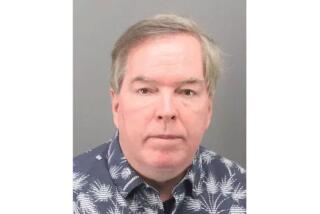Ex-Chairman of O.C. Firm Gets Prison Term for Fudging Tests
- Share via
LOS ANGELES — The former chairman of an Anaheim electronics company was sentenced Monday to three years in prison for falsifying safety tests on parts installed in important military equipment, including the MX missile.
David Ross was further ordered to pay a $25,000 fine and his company--the now-defunct Calprotech--must pay $1 million in fines for covering up defects and submitting phony certificates of conformance on company circuit boards placed in a wide range of military hardware, including the Bell AH-1T Cobra helicopter and the M-1 Abrams tank.
In delivering the sentence, U.S. District Judge Dickran Tevriziansaid Ross, an ex-Marine, had potentially threatened the lives of U.S. soldiers now stationed in the Persian Gulf.
“We have 250,000 troops ready to go to war with who knows how many Calprotech boards sitting in military equipment,” Tevrizian said. “There was a lot of fudging going on. There is an old saying, ‘Close enough for government work.’ That shouldn’t be.”
Ross, 50, was among seven Calprotech employees indicted last year in connection with the circuit board scheme. He was found guilty in September of conspiracy and making false statements. The maximum jail sentence possible was five years.
Federal investigators charged Calprotech with a host of violations including making cosmetic changes to hide manufacturing flaws. For instance, the company tried to repair short circuits on some boards using methods not allowed by military specifications.
What’s more, employees were told to keep testing different parts of the circuit board until they found a section that would pass, investigators said. And sometimes safety tests were switched around so one circuit board never tested--or that had flunked a test--might get shipped out bearing the test results from another board, they added.
Federal prosecutor Mike Emmick told Tevrizian that about 90% of suspect circuit boards had failed to live up to military specifications. But Ross’ defense attorney, Allan H. Stokke, said most of the boards worked perfectly.
“We don’t need to be worrying about failures out in the field,” Stokke said. “We’re not going to see airplanes falling out of the sky or tanks blowing up.”
Ross apologized in court, saying he was ready to serve whatever sentence the judge felt was appropriate. “It’s been four years of hell, and I’m very sorry for any of the hurt I’ve caused the people,” he said.
Emmick portrayed Ross, Calprotech’s sole shareholder, as a ruthless, egocentric man capable of persuading otherwise honest employees to commit felonies. He said Ross had expressed little remorse.
“He was essentially God at the company,” Emmick said. “There even was a saying at the company that “There was Ross’ way and the wrong way.’ He ruled with an iron fist.”
Stokke, on the other hand, appealed for leniency and pointed out that many contractors including Hughes and Rockwell had decided to go ahead and use Calprotech boards after independent testing indicated that they were suitably fit.
“Many of them are very happy with the Calprotech products,” Stokke said.
“That’s irrelevant,” Tevrizian concluded. “I have difficulty saying that means everything is OK.”
Emmick had appealed for a substantial sentence for Ross, claiming that he had lived the good life with ill-gotten gains.
“He lived in a million-dollar home, threw lavish parties and drove a high-performance Porsche,” Emmick said. “Mr. Ross has been living quite well because of his fraud.”
Tevrizian agreed that Ross benefited more than Calprotech’s employees.
“What did these employees have to gain by cutting corners? The employees didn’t put anything in their pockets,” Tevrizian said. “Mr. Ross benefited in the bottom line.”
Tustin resident and former Calprotech general manager Gary Davies also was sentenced Monday to three years’ probation for his role in the scheme. Four more former employees are scheduled for sentencing next week.
“I’ve lived with this for five years, and it’s something that as I go through each day stays with me as being wrong,” said Davies, who had cooperated with federal prosecutors in the case against his former boss.
Stokke said Calprotech employees must shoulder some of the burden for what transpired. “He clearly did demand a lot from his employees, but I don’t think we can say they are completely not at fault,” he said.
The company went out of business in 1988.
More to Read
Inside the business of entertainment
The Wide Shot brings you news, analysis and insights on everything from streaming wars to production — and what it all means for the future.
You may occasionally receive promotional content from the Los Angeles Times.










